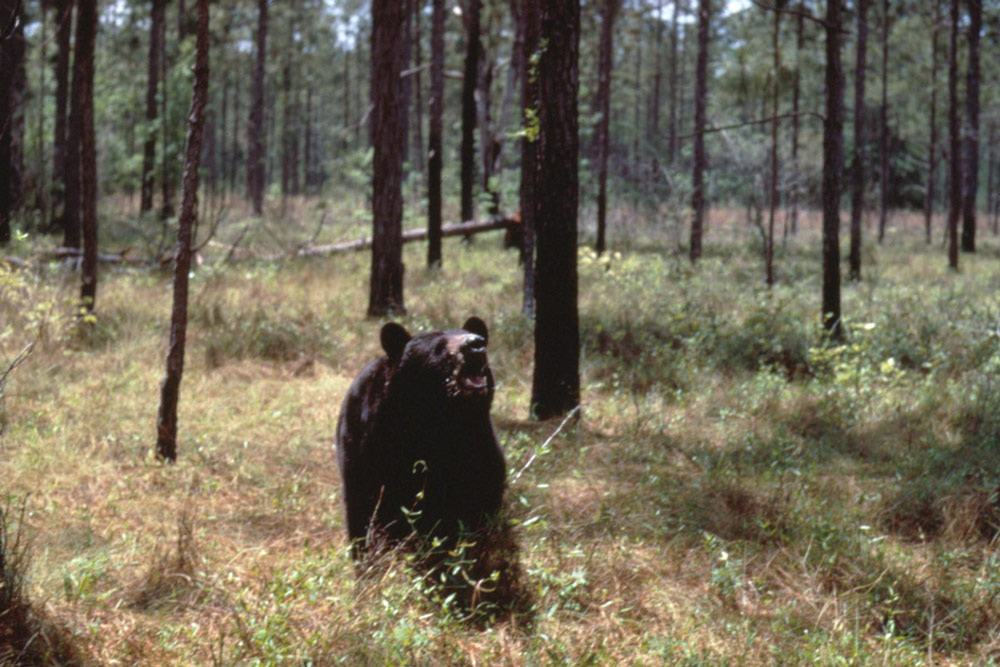
The Florida Fish and Wildlife Conservation Commission (FWC) has concluded its initial investigation into what is confirmed to be the first fatal Florida black bear attack in state history this week in Jerome, Florida.
On Monday morning, May 5, the Collier County Sheriff’s Office notified FWC staff of a possible fatal wildlife encounter. Family members reported a relative missing from his residence and signs of recent disturbances that could have been caused by a bear or bears around the property. FWC law enforcement and bear management staff immediately responded to secure the area, prioritize public safety, collect information and implement standing protocols to lethally remove any bears suspected of being involved.
The remains of 89-year-old Robert Markel were found approximately 100 yards from his home. Investigators noted several key findings: (1) evidence indicating a physical encounter between a bear and a person near the residence; (2) a dog recently killed by a bear in close proximity to a person; and (3) signs that a bear had entered the residence itself. The exact sequence of events remains unclear. The FWC’s Human-Bear Conflict Response Policies and Guidelines outline how the agency should respond when faced with situations that require the removal of a bear for public safety. In this case, each of the three documented circumstances mentioned above requires lethal removal. The FWC does not make that decision lightly.
From Monday evening into early Tuesday morning, FWC personnel lethally removed three adult male bears weighing 207, 263 and 434 pounds. There was an unsuccessful attempt to trap a fourth bear; however, DNA evidence was collected. The three carcasses were immediately transported to laboratories in Gainesville for necropsy and testing, along with DNA samples collected from physical evidence at the scene.
The Collier County Medical Examiner is still in the process of completing their investigation, but indicated the preliminary cause of death was consistent with injuries caused by a black bear. Necropsy results revealed that one bear (263-pound male) contained the partial remains of Markel. DNA results received on Friday, May 9, positively identified that the 263-pound male’s DNA was present on Markel, inside his residence and on the dog’s body. The only bear DNA found at the scene matched the three bears lethally taken. All three bears were tested for rabies, and all results were negative.
FWC law enforcement and bear management staff stayed in contact with the family and maintained a presence near the property from Monday through Friday, May 9. During that time, they observed only one additional bear in the area, which briefly appeared late Thursday night and then left the area. Law enforcement and bear management staff will remain throughout the weekend.
“We want to thank the family for their cooperation as they navigate this challenging time, and our thoughts remain with them,” said FWC Chairman Rodney Barreto. “I am proud of our staff’s professional response and support for the family as they faced an unfathomable event this week.”
Jerome is in the South Bear Management Unit, which has the third largest population of bears in the state, estimated at 1,044 in 2015. Demographic analysis indicates this population has a positive annual growth rate. The FWC received 16 bear-related calls within a 10-mile radius of nearby Copeland between May 5, 2024, and May 4, 2025, resulting in five site visits, five capture efforts, three bears that were relocated and hazed, and one bear that was humanely killed.
While it is rare for wild black bears to injure people in Florida, people have been bitten and scratched by bears, most often when there are cubs, food sources or dogs present. The FWC receives an average of 6,300 bear-related calls annually and has documented 42 prior incidents where wild black bears have made physical contact with people since the 1970s, when comprehensive records began being kept. Of those, three resulted in serious injuries requiring medical attention prior to this incident.
Guidelines for what to do in the event a bear approaches you are available at MyFWC.com/Bear. To learn more about bears and how to avoid conflicts with them, visit BearWise.org.
Please contact the FWC’s Wildlife Alert Hotline at 888-404-FWCC (3922) if you feel threatened by a bear; observe a sick, injured, dead, or orphaned bear; or to report someone who is either harming bears or intentionally feeding them.
The investigation will remain open until all testing is completed and the results have been thoroughly reviewed.





























JimboXYZ says
This for a black bear attack & fatality, alligator attacks & fatalities. Let’s keep on growing statewide, put up more solar farms and deforest the land to increase encounters. See how that goes as if it’s not predictable outcomes.
Atwp says
Am sure this is not the end of human bear encounters. Population growth and animal contact don’t always end well. As I’m commenting just saw a deer across my back fence, how long will he stay alive? Human population growth usually mean a decrease of animal population. Not glad about the lost of human life.
JeffM says
It’s rare anywhere, but can happen. An elderly woman living in a California mountain community near where I used to live was killed in her own home in 2023. It broke down her door. Also the first known death from a bear attack in that state. As many bears are in Florida I wouldn’t go hiking around anywhere without at least bear spray.
celia pugliese says
Very tragic and sad event for both the human loss of life, his fateful dog and also the euthanized bears. I recall no that long ago a bear was roaming along Clubhouse Drive but people saw and video but kept the distance and he went peacefully on his journey elsewhere with no incidents. The more land we take from wildlife the more encounters…but FL needs to learn from Asheville NC to handle and respect black bears: https://www.facebook.com/watch/?v=353296877266331